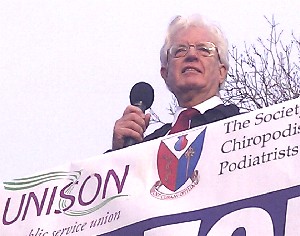 From New Statesman 13 September 2004: Over the past 12 months, the issue of pensions has started to rise up the political agenda and capture headlines. On all the available evidence, even the most cautious commentator would now accept that pensions are in crisis – and apart from “gold-plating” their own pension arrangements, politicians have so far done very little to tackle the problem effectively. Indeed, the government’s current approach is cementing the difficulties facing not only those already in retirement, but also the generations to come.
From New Statesman 13 September 2004: Over the past 12 months, the issue of pensions has started to rise up the political agenda and capture headlines. On all the available evidence, even the most cautious commentator would now accept that pensions are in crisis – and apart from “gold-plating” their own pension arrangements, politicians have so far done very little to tackle the problem effectively. Indeed, the government’s current approach is cementing the difficulties facing not only those already in retirement, but also the generations to come.
On coming to power in 1997, Labour ministers announced their intention to reverse the existing pension provision ratio of 60 per cent from the state and 40 per cent from the pri- vate sector. Their plan was seriously flawed. The private pensions industry has been dogged by corruption, scandal and mismanagement on a global scale, and the fall in the stock market has wiped millions of pounds from pension values. The stakeholder pension scheme, aimed at the low-paid, has turned out to be little more than a way for the well-off to make even more money, while the final salary schemes of those with an occupational pension are also under threat. Every month, another such scheme closes to new entrants and is replaced by a more risky and less generous alternative.
To make matters worse, after years of making contributions, thousands of workers have lost their company pensions as their firms go out of business – and the government’s proposed protection scheme will provide little relief for those who have already been cheated. For millions of other workers, particularly women and the low-paid, having a company pension of any description is pure fantasy.
The pensioners of tomorrow are therefore being forced to gamble their hard-earned retirement on a system based on the economics of the casino, and it is vital to promote a credible alternative. Trade unionists, think-tanks, academics and others agree with the National Pensioners Convention that the state pension provides the most effective way of delivering financial security and dignity to all in retirement.
The basic state pension must be substantially raised and paid to all, as a matter of urgency, to help combat growing pensioner poverty and end the need for widespread means-testing of Britain’s older population. The link between pensions and average earnings must then be restored to ensure that pensioners get to share in the growing prosperity of the nation that they helped to create. It must also be made easier for women, part-time workers and the low-paid to achieve entitlement to a full state pension by relaxing the current rules on qualifying years and national insurance credits.
Fundamentally, however, we need a debate about how society prepares for and funds its retirement. The idea that we cannot afford to pay for an ageing population is nonsense. With the fourth-strongest economy in the world, Britain can do better than the pitiful state pension of less than £80 a week. Employers have a responsibility to make greater contributions towards state pensions – like their European counterparts – and rather than diverting money into the private sector, we must seriously consider how an improved and reinvigorated state system can offer everyone a decent income in their later years.
Pensions never used to be seen as very important or even newsworthy. Now they have become a battleground for ideas. We have a responsibility to reassert the view that collective pension provision is the best way of ensuring that retirement is a thing to which everyone can look forward, rather than fear. After decades of work, ordinary men and women have a right to a decent period of rest in which they can live without having to worry about how the next bill can be paid. It’s an achievable ideal.
Rodney Bickerstaffe is president of the National Pensioners Convention


